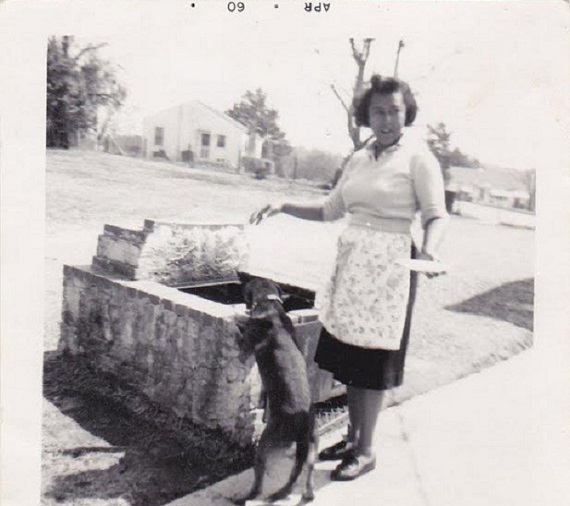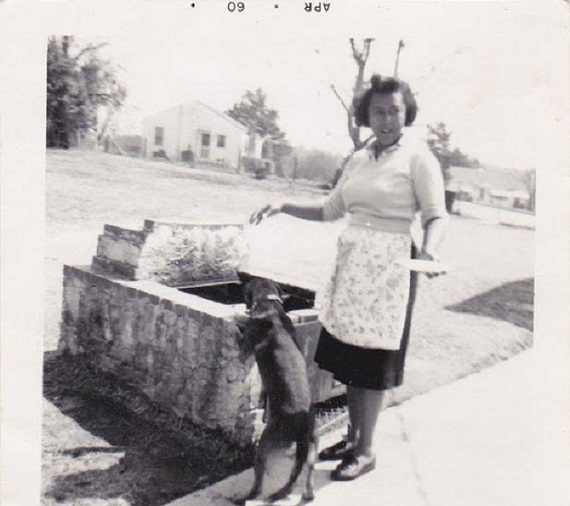They say that writing is good for the soul, and my soul needs something good. So, I think it’s time I talked about being one of the Southern white babies raised by a black maid. Sometimes, I forget that I not only grew up during the Civil Rights struggle, I grew up in the middle of it. It wasn’t something that we watched on the news every evening that took place somewhere else in the country – we watched it out the windows of the car, or out the windows of the church, or out the door of our store. Or even literally in our own front yard. It was right there.
I know from talking with soldiers that their recollections of a particular battle are quite different from historical accounts written afterward. Historical accounts have a tendency to trim the edges in order to make something a better narrative and more digestible, when in fact, the real thing is usually chaotic, fluid, completely indescribable, and very hard to articulate. Things that make perfect sense in your head no longer make any sense at all when they’re spoken or written down.
That’s exactly the way I would describe my experience with the Civil Rights struggle. People outside the South have so many preconceived notions based on their examination of old black-and-white footage and documentaries that they often correct me on my own personal memories. People from outside the South have been fed a steady diet of the trimmed-down, tidied-up, progressively chronological version of events (including horribly simplified and unfair stereotypes) that people FROM the South are usually too mistrustful of their motives to talk to them about those times. Those of us who live here speak of those times often with each other, and then clam up whenever an “outsider” appears, because we simply don’t trust them. We’ve been burned too many times before by people twisting our words and memories, and we’ve learned (the hard way) to be cautious. And I fear that many of our very poignant stories and memories will go with us to the grave, because we just don’t trust other people well enough to speak candidly in front of them.
I guess the first misconception to block our openness comes from the ridiculous view that every white person in the South back then was either a freedom-rider or a Klansman. This incredibly stupid point of view is responsible for silencing a wealth of information that would be very useful to a contemporary young generation wrestling with its own cultural identity. I think the struggle of moderate Southern whites to be fair and good is an important page of American history, and the movie The Help is the ONLY movie I’ve ever seen to address the issue openly and accurately. In the movie, when the maids get to tell all their stories, you hear a lot of accounts of predictably horrible behavior by ignorant whites. However, you also get to hear some very touching examples of whites who were good, decent, fair, and treated everyone with respect and love, as well as moderate whites who simply didn’t know what to do.
I was raised by a black maid. I was born in 1960, and my sisters were 10 and 7 when I was born and my brother was 6. All of us were raised by the same black maid, named Lee Crump. Both of my parents worked, and Lee Crump was our daily in-home parent. She instilled her values into us in a way that merged with those of our real parents. She disciplined us (which included whipping our butts when we needed it), but more importantly, she had carte blanche to discipline any child in our neighborhood. If Lee Crump thought you needed a butt-whipping, then you absolutely deserved to get one. And everybody’s parents accepted that. I’ll never forget one time when Lee Crump was whipping me with a fly-swatter, and my brother chimed in, “Don’t hit him with a fly-swatter – he’s not a fly.” Her response was to whip HIM with the fly-swatter.
Lee Crump taught us to treat everyone with respect, no matter what color they were, and she taught us that both evil and goodness came in all colors. She also taught us that while we should treat everyone with respect, we should never demand respect from anyone else – we should always earn it.
She used to let me touch her hands over and over again, as I was totally fascinated that the palms of her hands looked exactly like mine, but the backs of her hands were completely different. There was an incredibly valuable lesson in that experience. During those times, it was also considered offensive to refer to African Americans as “black.” The proper terminology back then was “negro,” and the one time I made the mistake of calling her “black,” she shoved the back of her hand in my face and yelled, “Boy, my skin is BROWN. I ain’t black.” From that, I learned that words we use to describe people matter a great deal to those people, and we should try to follow their wishes. She also let my sisters put make-up on her, just to see what happened to makeup on brown skin. I’ll never forget that one of my sisters was captivated with the sight of ruby red lipstick on a face with brown skin, and she always bugged Lee Crump to surrender to her practice makeovers. Lee Crump wore a wig. Her real hair was braided tight against her head, and she wore wigs that resembled white hair (straight hair).
Lee Crump was also responsible for all the housework (vacuuming, dusting, etc.), but notice I didn’t say she was required to do it all – she only had to make sure it got done somehow, and that’s where we all fit in. She made ALL of us kids work as if we were her little maids. She divided the chores amongst all of us, and she wouldn’t let us go outside to play until everything was done. If friends came over (or even wandered too close for safety), they were immediately drafted into service. Thanks to Lee Crump, every kid in our neighborhood was an expert on making beds, vacuuming, dusting, shelling peas and beans, shucking corn, and sweeping. To this day, I still challenge all-comers to try and shell peas better than I can do. I also distinctly remember her busting into my bedroom on a summer morning and yelling, “Boy, get yo’ lazy ass outta that bed, and move it. Make up that bed. NOW! You got sweeping to do.”
Lee Crump pointed out to all of us that stupidity came in all colors. She referred to many folks – both black and white – as “monkey fools.” A monkey fool was the worst thing you could be, in her eyes. It meant you didn’t have any sense, and nobody wanted to be called a monkey fool by Lee Crump.
She also knew absolutely EVERYBODY in town. If you walked anywhere in town with Lee Crump, your entire experience was filled with constant horn honking and greetings. I’m pretty sure she really did know everybody, and from watching her, I learned how to greet everybody with a smile and kindness no matter how crappy you felt at that moment. “Don’t nobody wanna see yo’ ass,” was her way of saying that nobody wanted to see the bad side of you if your mood was foul. According to the wisdom of Lee Crump, you were supposed to suck it up and pretend to be pleasant whether you felt that way or not.
Lee Crump loved Martin Luther King, Jr., and hated Malcolm X (a monkey fool, in her opinion). She loved John Kennedy and hated LBJ (another monkey fool). In the front entryway of her home, there were three portraits hanging together – Jesus, Dr. King, and JFK. She loved Cassius Clay and hated Mohammed Ali. And she loved Rev. Billy Graham. My God, that woman LOVED Billy Graham. Whenever my parents went out and she babysat for us at night, the ONLY thing on our TV set was Billy Graham.
Lee Crump had a loving husband and a daughter, and we knew all of them very well. Her daughter was the same age as one of my sisters, and they played together frequently. She had hogs at her house, and any food scraps from our table were collected “for the hogs.” Lee Crump was a very vocal singer in her church, and she practiced her gospel singing around our house all day long. She introduced us to the music of Aretha Franklin, and I was probably the first white kid in my 1st grade class to know all the words to “Chain of Fools.” And when our local school system was finally integrated by a federal judge’s order in 1969, Lee Crump sat me down very seriously and told me what to expect from the “negro chillun.”
I also learned so many things from her that I would otherwise have never been exposed to. I share a number of beliefs and superstitions of the “negro” community to this day. If you hear a hoot owl during the day someone is going to pass. I had this happen just this past year. I know which birds are good luck, which are bad, what ants crawling up a pine tree means (storm is coming, lots of rain). My style of cooking is more “soul food” than anything else and I must admit I’m very good at it.
When all of us were all finally grown up, my father set her up in her own second-hand clothing store so that Lee Crump could continue to have a job. He rented a storefront for her and paid her rent, and she spent several days a week buying and selling clothes for many years.
When she died five years ago, my family was the only white family at her service (which is not at all an unusual sight at Southern black funerals, or “home-goings”). She would have loved all the preaching and all the singing. I often talk about all the wonderful things my parents did for me growing up, but I almost never mention how much I owe my social development to Lee Crump. It’s too hard to talk about. It’s not too emotional – it’s just too hard to explain to anybody else who didn’t go through the same thing. Many people who didn’t grow up in this environment don’t understand why the maids didn’t resent us, but unless you lived it, it is so hard to explain the love and affection that was really there. An entire generation of whites were raised, shaped, and molded by black maids, and I don’t think many people realize how much of a difference those maids were in molding a softer, more generous and tolerant generation of Southern whites.
Some people think of the civil rights movement as a much needed revolution, when, in fact , it took a lot more than simply passing some laws to make it a reality. Sure there were some old die-hards for whom the past was a shaky foundation they were afraid to let go. Change, good or bad, can be frightening. But it was the overall quiet majority of Southern whites who were willing to try and make astronomical change in their lifetime that I credit with making such a radical difference. The “Negros” of the time were beyond ready to move on, but it couldn’t have happened without both sides working together to make it a reality. Having been to other parts of the country, I honestly feel the South is more integrated than any of the other regions I’ve visited.
Thank you, Lee Crump.







